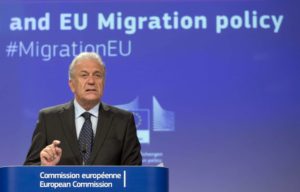
European Commissioner for Migration and Home Affairs Dimitris Avramopoulos speaks during a media conference at EU headquarters in Brussels (AP Photo/Virginia Mayo)
BRUSSELS (AP) — The European Union unveiled a new plan Wednesday to resettle at least 50,000 refugees, the majority of them from northern Africa.
The EU’s executive branch, the European Commission, said it has set aside 500 million euros ($587 million) for the effort. It wants refugees in Libya, Egypt, Niger, Sudan, Chad and Ethiopia to be the focus.
Libya is the main jumping-off point for many people willing to brave potentially perilous sea voyages across the Mediterranean in search of better lives in Europe. Egypt, Sudan, Chad and Niger — one of the main migrant transit countries in Africa — all border Libya.
Most of the migrants crossing the Mediterranean probably would not qualify for asylum in Europe, but the EU wants to make sure that genuine refugees do not have to face the dangerous sea crossing.
“Europe has to show that it is ready to share responsibility with third countries, notably in Africa. People who are in genuine need of protection should not risk their lives or depend on smugglers,” EU Migration Commissioner Dimitris Avramopoulos said.
European countries are individually responsible for deciding on resettlement numbers so they cannot be legally bound by Brussels to take more people in.
The Commission also wants to set up pilot projects to help create more legal ways for nationals of countries that are cooperating with the EU to come to Europe.
The move is part of the EU’s effort to cope with hundreds of thousands of refugees and unauthorized migrants who have tried to enter Europe in recent years, undermining European solidarity as countries bickered over how to manage the problem.
The EU’s executive arm also wants to ensure that those not permitted to stay are returned to their home countries more quickly. Only around one third of those deemed ineligible are actually sent back.
“We have to be clear and brutally honest, people who have no right to stay in Europe must be returned,” Avramopoulos said.
He also said that the Commission would propose a temporary extension to allow countries like Germany, Austria, Denmark and non-EU country Norway to keep systematic ID checks in place.
Avramopoulos it would modify the rule book governing the 26-nation passport-free travel area known as Schengen, where systematic checks on all travelers are not allowed. It would authorize border checks for another two years.


